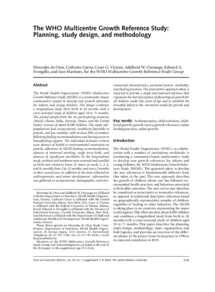Document
The WHO multicentre growth reference study : planning, study design, and methodology.
Identifier
DOI: 10.1177/15648265040251s104
Source
Food and Nutrition Bulletin. v. 25, 1. 1, p. S15-S26
Contributors
Victora, Cesar G. , Author
Garza, Cutberto. , Author
Onyango, Adelheid W., Author
Frongillo, Edward A. , Author
Martines, Jose., Author
Country
Japan
City
Tokyo
Publisher
United Nations University Press.
Gregorian
2004-03-01
Language
English
Subject (Name)
English abstract
The World Health Organization (WHO) Multicentre Growth Reference Study (MGRS) is a community-based, multicountry project to develop new growth references for infants and young children. The design combines a longitudinal study from birth to 24 months with a cross-sectional study of children aged 18 to 71 months. The pooled sample from the six participating countries (Brazil, Ghana, India, Norway, Oman, and the United States) consists of about 8,500 children. The study sub-populations had socioeconomic conditions favorable to growth, and low mobility, with at least 20% of mothers following feeding recommendations and having access to breastfeeding support. The individual inclusion criteria were absence of health or environmental constraints on growth, adherence to MGRS feeding recommendations, absence of maternal smoking, single term birth, and absence of significant morbidity. In the longitudinal study, mothers and newborns were screened and enrolled at birth and visited at home 21 times: at weeks 1, 2, 4, and 6; monthly from 2 to 12 months; and every 2 months in their second year. In addition to the data collected on anthropometry and motor development, information was gathered on socioeconomic, demographic, and environmental characteristics, perinatal factors, morbidity, and feeding practices. The prescriptive approach taken is expected to provide a single international reference that represents the best description of physiological growth for all children under five years of age and to establish the breastfed infant as the normative model for growth and development.
ISSN
0379-5721
Category
Journal articles

